Value chain – logistics and sales
Sales of motor fuels
The volume of the LOTOS Group’s gasoline sales amounted to 1.5 million tonnes, up by 0.4% over the year before. Relative to 2012, there was a shift in the structure of gasoline sales – in view of the economic downturn and falling demand for gasoline seen in recent years on the Polish market, the product was sold on the receptive export markets of the Netherlands, Sweden and the UK.
In 2013, a 6% decline in demand for diesel oil led to a 4.8% decrease in total sales of that fuel by the LOTOS Group. A drop in domestic sales was largely compensated by exports, which grew 25% year on year, with Germany, the UK, the Netherlands, France, Denmark and the Czech Republic accounting for the bulk of foreign sales.
Source: The LOTOS Group in-house data.
Source: The LOTOS Group in-house data.
Sales of diesel oil [tonnes]
Source: The LOTOS Group in-house data.
Sales of aviation fuel
In 2013, the LOTOS Group recorded a 17% drop in sales of aviation fuel, while still remaining the main Polish exporter of that fuel. Intra-Community sales accounted for the majority of exports, with the main customers located in Sweden, the Czech Republic, Finland, Denmark and Switzerland. Domestic sales were conducted via two channels: into plane and wholesale. As part of the into plane fuelling service, fuel was delivered to airline customers operating on the Polish airports in Gdańsk, Warsaw and Kraków. In the wholesale channel, sales were mainly to the aviation industry.
Sales of aviation fuel [tonnes]
Source: The LOTOS Group in-house data.
Sales of LPG
In 2013, for another year running, Grupa LOTOS recorded an increase in LPG sales both in Poland and on foreign markets. The increase was linked to the introduction of natural gas as a production feedstock, which had taken place a year earlier. The Polish LPG market is characterised by a huge deficit, with almost 90% of total demand being satisfied by imports, and thus our additional LPG output was channelled to the Polish market. The key export markets for the product included Germany and Serbia.
Sales of LPG [tonnes]
Source: The LOTOS Group in-house data.
{GRI PR1, PR2, PR3}
The impact of our fuels on human health and safety is assessed at the production stage. For each type of fuel, a Safety Data Sheet (SDS) for hazardous substances is prepared, including information on all potential hazards associated with the use of the fuel and required precautions. An SDS is delivered directly to each wholesale customer and is available to retail customers at the LOTOS service stations.
Given the fact that we use road or railway transport to supply fuels to customers, internal procedures have been developed to ensure safety and limit the adverse effect of fuels in transit on human health. Railway transport is handled and supervised in terms of safety and health protection by LOTOS Kolej, whereas road transport is fully outsourced to third parties. Nevertheless, we still oversee the safety of this stage of distribution, by providing tank truck drivers with procedures on how to handle their cargoes and the hazard class of the fuels they carry.
As part of our supervision of road transport in terms of safety and health protection, we undertake regular field inspections. The monitoring covers:
- Loading operations at depots,
- Safe passage of tank trucks over monitored routes, including correct cargo marking as required by applicable regulations,
- Safety of unloading sites,
- Unloading in line with the established procedure and conformity with the procedure,
- Procedurę in case of spills, failures.
Sales of lube products
In 2013, the LOTOS Group sold 254 thousand tonnes of lube products. The principal distribution channels on the Polish market included wholesale and direct sales. The main foreign markets for our lubricating oils were EU countries, as well as countries in Central and Middle Asia, the Middle East, and Africa. In 2013, newly acquired customers for LOTOS Oil products included partners from China, France, the Netherlands, Iran, Tunisia, Turkey and UAE.
In 2013, LOTOS-branded oil products were sold in 59 countries.
Sales of lube products [tonnes]
Source: The LOTOS Group in-house data.
Sales of lube products [tonnes]
Source: The LOTOS Group in-house data.
{GRI PR1, PR2, PR3, PR4, PR9}
All products manufactured by LOTOS Oil are appropriately labelled with information about their potential health impacts and environmental hazards.
Extent of the product and service information required by LOTOS Oil’s internal procedures:
| Source of the product or service components | Thanks to the provision of registration numbers for hazardous substances, it is possible to access information on each product’s health impacts and environmental hazards, such as carcinogenic effects, fertility impact, bioaccumulations, etc. Information on the commercial source of a product, i.e. its supplier, is not provided. |
| Content, particularly substances that might have an environmental or social impact | |
| Safe use of the product or service | Guidelines on how to safely use and handle hazardous substances are also included in the Safety Data Sheets. In addition, labels on packaged products include pictograms providing information about the risks posed by the product. Safety Data Sheets are available on LOTOS Oil’s website. |
| Disposal of the product and its environmental/social impact | Lubricating oils are subject to the Act on Obligations of Entrepreneurs in Respect of Management of Certain Waste and Product Charges, dated May 11th 2001 and secondary regulations, and thus are collected and transferred for disposal in quantities required by the Act. |
| Product policy | In line with LOTOS Oil’s product policy, products marketed by the company exceed the statutory requirements with respect to environment and health protection. The QUANTILUS T50 and QUANTILUS 60 plasticisers, placed on the market over the last three years, may serve as a case in point, since they meet all requirements related to mutagenicity level and content of carcinogenic agents, as confirmed by independent laboratories. Another example is the upgrading of motor oil lines in accordance with the ACEA specifications, requiring such products’ conformity with the exhaust after treatment systems in passenger cars and trucks. Approximately 22% of the company’s oil products bear special labelling. |
Life cycle stages at which the impact of LOTOS Oil’s products on health and safety is assessed
- Concept of product development
- Research and development
- Certification
- Manufacturing and production
- Marketing and promotion
- Stocks distribution and supply
- Use and service
- Disposal, reuse or recycling
In 2013, LOTOS Oil recorded no incidents of non-compliance with applicable regulations, rules and codes concerning health and safety impacts of the company’s products and services. Similarly, there were no incidents of non-compliance with the regulations and voluntarily applied procedures concerning the marking and provision of information on products and services. No sanctions were imposed on LOTOS Oil resulting from its non-compliance with the applicable laws or regulations pertaining to the provision and use of the company’s services and products.
Sales of heavy fuel oil
2013 saw a 1% overall increase in sales of heavy fuel oil, which − next to diesel oil and gasoline − is a key product sold by the LOTOS Group. The increase came on the back of a 6% growth in exports, mainly to international trading companies. In Poland, the product was sold primarily to power sector companies.
Sales of heavy fuel oil [tonnes]
Source: The LOTOS Group in-house data.
Sales of heating diesel oil
A slide in domestic demand for light fuel oil in favour of alternative heating fuels, caused our 2013 sales of the product to shrink 13% year on year, to 293 thousand tonnes.
Sales of heating diesel oil [tonnes]
Source: The LOTOS Group in-house data.
Sales of heating diesel oil [tonnes]
Source: The LOTOS Group in-house data.
Sales of bitumens
In 2013, there was a 19% year-on-year drop in total bitumen sales, attributable to weaker financial performance of construction companies, as well as the economic crisis prevailing across the EU with a resulting decline in infrastructure investment. Similarly to previous years, road bitumen had the largest share in total bitumen sales (around 80%). The remaining volume of bitumens sold by the LOTOS Group included modified and industrial bitumens. Only road (90%) and modified (10%) bitumens were exported, chiefly to European countries, including Sweden, the UK, Germany, Switzerland, Lithuania, Romania and the Czech Republic. Record sales were recorded in Germany, and in Romania LOTOS Asfalt established its first foreign terminal, which will strengthen its foothold in the market thanks to markedly improved logistics and measurable economic benefits.
Sales of bitumens [tonnes]
Source: The LOTOS Group in-house data.
{GRI PR1, PR2, PR3, PR4, PR9}
LOTOS Asfalt manufactures construction materials which include such product categories as paving grade bitumens, modified bitumens, bituminous emulsions and waterproofing materials (until June 2013). The manufacturer is required to provide full product information for each product classified into a given category. Mandatory provision of product-related information is required for over 98% of the total volume of products sold by LOTOS Asfalt.
In addition, although petroleum bitumens are not listed among hazardous substances, bitumen products manufactured by LOTOS Asfalt are sold with the Information Sheet for substances or admixtures for which a Safety Data Sheet (SDS) is not required. It contains information on the product ingredients and up-to-date recommendations on its safe handling.
Extent of the product and service information required by LOTOS Asfalt’s internal procedures:
- Source of the product or service components
- Content, particularly substances that might have an environmental or social impact
- Safe use of the product or service
- Disposal of the product and its environmental/social impact
At LOTOS Asfalt, health impact and safety assessments are performed virtually throughout a product’s life cycle. If the assessments identify any issue, steps are taken to fully eliminate or at least minimise potential hazards to the natural environment and human safety.
Paving grade bitumens, which account for more than 95% of the company’s production volume, are subject to conformity assessment, whose outcome is a warranty for the consumer that the product has appropriate functional properties and meets the relevant requirements for construction products. Declarations of Performance (DoP) have been drawn up for LOTOS Asfalt products.
To ensure the safe use of the products − safety enhancement measures have also been extended to their transport and distribution. There are written manuals and videos on how to safely handle bitumens during loading, unloading and transport. The providers of transport services are also assessed for compliance with LOTOS Asfalt’s safety standards.
Life cycle stages at which the impact of LOTOS Asfalt’s products on health and safety is assessed
- Concept of product development
- Research and development
- Certification
- Manufacturing and production
- Marketing and promotion
- Stocks distribution and supply
- Use and service
In 2013, LOTOS Asfalt recorded no incidents of non-compliance with the applicable regulations concerning product health impacts, markings or provision of information on products and services. No significant penalties for non-compliance with laws or regulations concerning the provision and use of products and services were imposed on the company, either.
Logistics
Logistics is consistently adapted to the requirements of our trading operations, while we keep building an efficient distribution system that meets the expectations of customers, but also helps reduce costs. The purpose of these measures is to build a logistics chain that would function optimally in the constantly changing external and internal environments.
To ensure that our logistics assets operate more efficiently, in 2013 we began to consolidate fuel depots within the LOTOS Group. The first stage of the process consisted in reorganising companies in the south of Poland, changing their business profiles and, consequently, changing their names to LOTOS Terminale and LOTOS Infrastruktura. The next stage culminated in the transfer of ownership of the Rypin and Piotrków Trybunalski fuel depots to LOTOS Terminale. Also, construction work on comprehensive upgrading of the Grupa LOTOS fuel depot in Pozna_ was begun. The consolidation process is expected to be completed in 2014.
In 2013, work continued on fully automating and centralising road tanker filling operations at our own depots. A self-service road tanker filling unit was commissioned at the terminal in Gda_sk, and we plan to gradually roll out similar systems at other locations throughout 2014. The introduction of homogeneous solutions will help us achieve work standardisation and implement uniform interfaces for the exchange of data and reporting of processes related to release of products at the LOTOS Group's fuel depots.
In the area of secondary logistics, we launched supplies of the JET A-1 aviation fuel for the Warsaw airport. Motor fuel deliveries to hypermarket service station operators were also begun.
Preparations continued for the construction of a petroleum product handling terminal on the Martwa Wis_a river in Gda_sk. When completed, the terminal will handle exports and imports of feedstock components and product loads of up to 5,000 tonnes from our own wharf.
Rail transport
Rail transport of products from the Grupa LOTOS refinery in Gdańsk is a mainstay of our production security. Comprehensive services in the area of rail logistics are provided by LOTOS Kolej, which ensures economically viable, efficient and safe rail freight throughout Poland, and − relying on its well-established forwarding capabilities − can also arrange rail transport across the EU. LOTOS Kolej’s services involve:
- Management and operation of railroad sidings;
- Rail freight;
- Maintenance of railway infrastructure and rolling stock;
- Eco-friendly cleaning of rail tank cars.
LOTOS Kolej leads the industry in use of advanced technology solutions, deploying and refining a number of IT systems designed to optimise the logistics processes. All loading and unloading operations are controlled by the Rail Logistics System, which ensures that rail transport is efficiently managed. Trains are monitored in real time in conjunction with the Operational Work Recording System of PKP Polskie Linie Kolejowe.
All LOTOS Kolej’s locomotives are fitted with mobile IT systems allowing to transmit operational data and train documents from any place within the PKP network, which is a pioneer solution in Poland. The applied solutions are highly appreciated by customers, as they give them real-time access to reliable information on service status.
Thanks to cutting-edge technologies combined with innovative rail logistics, the company is able to offer both full-train and single-car freight services, which positions it strongly against competition.
LOTOS Kolej is among the market leaders in terms of using the most modern locomotive fleets in Poland, which increases the efficiency of its transport services, guaranteeing their high quality.
As at the end of 2013, modern locomotives represented 28% of the company’s rolling stock, securing it a firm position among rail operators with the most advanced locomotive fleets in Poland.
As a result of its continuous development, LOTOS Kolej has the potential to fully satisfy the transportation needs of LOTOS Group companies and, increasingly, to render transport services to third-party customers.
Volume of freight transported [million tonnes]
In 2013, LOTOS Kolej transported a total of over 9.4m tonnes, including cargoes of over 4.3m tonnes hauled for third-party customers.
LOTOS Kolej ranks among Poland’s leading rail carriers, whose share in the domestic market of 7.76%, measured in terms of rail freight volumes, makes it the number two player on the market.
Increase in the volume of rail freight hauled by LOTOS Kolej over a decade [thousand tonnes]
Source: The LOTOS Group in-house data.
LOTOS Kolej’s share in the domestic freight market in 2013 (%)
Source: In-house analysis of the LOTOS Group based on data from the Railway Transport Authority (Urząd Transportu Kolejowego).
{GRI PR1, PR2, PR3, PR4, PR9}
As a rail carrier, LOTOS Kolej has a specialist focus on transport of dangerous goods(1). Consignors of dangerous goods are required to place relevant information plates on each side of the rail cars carrying such goods, specifying the good’s identification number (UN number) and hazard identifier, as well as warning labels for a given good. This obligation also applies to empty, uncleaned rail cars and containers in which hazardous substances had been carried, as well as rail cars carrying hazardous waste.
(1) Dangerous goods are products and materials which – given their physical, chemical or biological properties – pose a potential safety threat if not properly handled during transport, or, in cases of failure or accidents, may cause a risk to human health or life, the natural environment or property.
In 2013 − as in previous years − LOTOS Kolej recorded no incidents of incorrect or defective marking of consignments of dangerous goods, or any penalties imposed on it for non-compliance with the applicable laws and regulations pertaining to the marking of such consignments.
{GRI PR1}
Extent of the product and service information required by LOTOS Kolej’s internal procedures:
- Source of the product or service components
- Content, particularly substances that might have an environmental or social impact
- Safe use of the product or service
- Disposal of the product and its environmental/social impact
Life cycle stages at which the impact of LOTOS Kolej’s products on health and safety is improved
- Concept of product development
- Certification
- Manufacturing and production
- Marketing and promotion
- Stocks distribution and supply
- Use and service
- Disposal, reuse or recycling.
In 2013, there were 17 accidents involving LOTOS Kolej’s staff and rolling stock (against 13 a year earlier) and one incident (against 5 in 2012).(2) As in 2012, one accident occurred by fault of the company’s employee. The downward trend in those statistics confirms the effectiveness of our steady efforts to improve the safety and quality of services provided.
(2) According to the classification provided for in the Regulation of the Minister of Transport, dated April 30th 2007
Sea transport
Freight transport by sea is a vital element of the LOTOS Group’s logistics chain. Having direct access to the product pipelines linking the refinery in Gdańsk to the liquid fuel handling facilities at Port Północny, we enjoy the considerable advantage of lower transportation costs. It is through maritime transport that we export the majority of petroleum products, and are supplied with a significant portion of raw materials and components for production.
2013 was a record year for Grupa LOTOS both in terms of the volume of cargo handled at sea ports and the number of tanker ships handled, which for the first time in the Company’s history exceeded 300.
The liquid fuel handling terminal owned by Naftoport is able to handle tankers with a maximum draught of 15 metres and a capacity to load up to 150,000 tonnes of crude oil or petroleum products. This allows Grupa LOTOS to export surplus products and sell them on the markets of Scandinavia, Northern and Western Europe and the Baltics. The direct connection to the port also facilitates imports of additional feedstock, including intermediate products for further deep processing at the refinery in Gdańsk, as well as fuel components. The coastal location allows us to respond quickly and flexibly to changing market conditions. Apart from the Naftoport fuel depot, we also use the Maritime Bulk Terminal in Gdynia and the Siarkopol terminal in Gdańsk to handle smaller cargoes.
Grupa LOTOS enjoys the advantage of having a refinery at a short distance from a cargo handling terminal, which allows it to diversify its supply sources and facilitates the shipping of crude oil from the Company’s own fields under the Baltic Sea and in Lithuania, and − in the future − crude oil produced from under the North Sea.
We are consistent in our efforts to take over the management of cargo transportation by sea, or to control the transportation process on the longest possible section of the supply chain, from the affreightment of ships to the formal handling of sea transport. This ensures greater control and helps streamline the planning of cargo handling at sea ports, thus allowing us to reduce the frequency of ship detention and optimise the related costs.
Petroleum product exports
In 2013, Grupa LOTOS exported 2,806 thousand tonnes of petroleum products, with a total value of PLN 7,445m.
Export revenue fell 5.1% year on year, chiefly on the back of lower refining margins in Europe. Despite the overhaul shutdown at the refinery in Gdańsk in 2013, the volume of exports went up 2.6%.
{GRI 2.7.}
Grupa LOTOS petroleum products were exported mainly to Northern and Western Europe.
| Naphtha | integrated oil and petrochemical companies in the Netherlands, Germany and Belgium | |
| Motor gasoline | petroleum hub in Rotterdam, Sweden and the UK | |
| Aviation fuel | Sweden, the Czech Republic, Finland, Denmark and Switzerland | |
| Diesel oil | Germany, the Netherlands, the UK and France | |
| Heavy fuel oil | storage depots of global trading companies in Estonia, Denmark and the Netherlands, and for further sale outside of Europe |
There was a considerable, 25%, year-on-year increase in diesel oil exports. Heavy fuel oil was the Company’s key export product in volume terms (over 1m tonnes in 2013).
Export sales by land have gained importance. The value of exports delivered by land in 2013 was up by almost 17% year on year, though export by land still accounts for a little more than 3% of the Company’s total export sales. Most of Grupa LOTOS’ export customers were international vertically integrated oil companies and trading houses. None of the customers accounted for more than 5% of total revenue.
LOTOS service stations
In 2013, work continued on expanding the LOTOS retail network by adding new stations to the CODO (company owned) and DOFO (franchise operated) chains. In the economy segment, we were rapidly developing the LOTOS Optima business concept. As a consequence of decisions made in previous years, 2013 was another period in which we curtailed retail sales through DODO service stations.
Number of LOTOS and LOTOS Optima service stations at the end of 2013
| LOTOS Premium segment |
142 CODO stations 14 MSAs 115 DOFO stations 17 DODO stations |
| LOTOS Optima Economy segment |
100 CODO stations 51 DOFO stations |
In an effort to expand the chain of CODO stations, properties are acquired, with the most important criterion for selecting a location being the sales potential of the local market. In 2013, we added 34 new locations to the CODO chain, including 3 MSAs (Motor Service Areas). Over the same time, the DOFO chain was expanded to include 11 new service stations.
Non-fuel sales represent a significant part of the business of the LOTOS service station chain. In 2013, we continued to develop the Cafe Punkt food service concept, expanding its food and product offering. Among the key initiatives launched in 2013 and continued in 2014 is the standardisation project, aimed to establish a uniform visual identity for the LOTOS retail chain.
Other achievements in the service station chain segment in 2013 included:
- Promotion of sales activity,
- Optimisation of margin on product sales from service station shops,
- Enhancement of the coffee offering at service stations, by
- Opening new cafés at more than 100 locations,
- Use of a special blend of freshly ground coffee exclusively for the LOTOS chain and introduction of larger, 300 ml coffee cups,
- Implementation of a financial efficiency improvement programme for the retail chain.
{GRI PR1, PR2, PR3, PR4, PR9}
LOTOS Paliwa markets ready-made fuels, meeting the quality requirements provided for in industrial standards and legal regulations. To ensure compliance, we regularly monitor the quality of fuels sold through the service station chain in terms of their conformity with the relevant requirements. Annual inspections of all fuel types are carried out at each station operating within the LOTOS chain.
In the case of fuel sales from CODO stations, LOTOS Paliwa sets the standards, and supervises adherence to those standards by the station managers. The process is governed by separate agreements and procedures, which are improved on a regular basis. As part of the established health and safety-related standards, the following areas are overseen and assessed for conformity with the applicable requirements:
- Fuel supplies,
- Supervision over the stations’ fuel infrastructure,
- Procedures in case of accidents and failures,
- Standards of safety with respect to customer service and fuel sales,
- Environmental management in accordance with the PN-EN ISO 14001:2005 standard,
- Occupational health and safety management in accordance with the PN-N-18001:2004 standard.
LOTOS Paliwa’s activity involving retail sales through CODO stations, conducted by the station managers, is strongly connected with the safety of service station personnel and customers. Given their nature, service stations are retail facilities exposed to the risk of aggressive behaviour by persons who are not customers. This kind of behaviour may pose a threat to the physical safety of the station’s employees. In 2013, 11 such instances were recorded.
We attach great importance to the safety of the personnel and customers of our service stations. With that end in mind, we have been taking and enhancing various technical, organizational and HR measures designed to prevent any potentially dangerous incidents.
Technical measures - protecting the service stations through:
- Appropriate lighting,
- Surveillance with the use of video cameras,
- Technical protection of building entrances and passageways,
- Alarm systems.
Organizational measures:
- Establishment and enhancement of procedures and instructions for service station managers and personnel telling them how to behave in case of specific hazards,
- Establishment and enhancement of physical security procedures,
- Employment of specialist providers of security services,
- Investigating incidents that have taken place at service stations and taking appropriate preventive measures.
In 2013, we reviewed our procedures relating to property security and provision of third-party security services.
HR measures:
- Provision of station managers with instructions on how to behave in case of hazards related to dangerous incidents and how to prevent such hazards,
- Provision of training to managers and personnel of new service stations. In 2013, training in safety procedures was provided to personnel of a few dozen service stations.
Last year, no instances were recorded of our products or services negatively affecting the health of LOTOS Paliwa’s employees. The managers of service stations, in their capacity of employers, are required by law to monitor the work environment at the stations and to ensure that all employees undergo medical check-ups.
In retail sales, information concerning the properties of fuels sold by the company is provided at a customer’s request in the form of Safety Data Sheets for hazardous substances. Service station dealers are required to provide, at a customer’s request, Safety Data Sheets for hazardous substances included in goods available from their stations.
Extent of the product and service information required by LOTOS Paliwa’s internal procedures
- Source of the product or service components
- Content, particularly substances that might have an environmental/social impact
- Safe use of the product or service
- Disposal of the product and its environmental/social impact
In 2013, LOTOS Paliwa identified no incidents of non-compliance with the regulations and voluntary codes concerning the marking and provision of information on fuel products. No significant penalties for non-compliance with laws or regulations concerning the provision and use of products and services were imposed on the company, either.
Challenges in strategy implementation until 2015
In line with our business strategy for fuel sales, we will primarily aim to further reinforce our market presence by:
- Maintaining a 30% share in the domestic fuel market;
- Achieving sales 15% in excess of the fuel production capacities of the Grupa LOTOS refinery;
- Securing a 10% share in the domestic retail market through sustainable development of the service station chain and enhanced sales from the existing chain.
In sales of lubricating oils, the key objective is to retain our leading position on the domestic market.
In sales of other products, the key objective is to optimise financial performance by leveraging our resources and market conditions.
Customer satisfaction
{GRI PR5}
In line with our CSR strategy, which supports the effective pursuit of our business strategy, the primary objective is to build lasting customer relationships through a focus on understanding customers’ needs and delivering the expected product quality and safety, measured as the level of customer satisfaction with the LOTOS Group’s marketing companies.
Progress in this area is monitored by means of regular surveys. Customer satisfaction surveys are intended to gauge the level of customer satisfaction with the quality of their relationships with the LOTOS Group. Their scope covers:
- Factors behind the choice of a supplier,
- Interactions with staff, staff accessibility and competences,
- Quality and availability of products,
- Response times to RFQs,
- Pricing relative to peers,
- LOTOS Group’s perception.
Satisfaction surveys among the LOTOS Group’s customers
| Company | Survey frequency (number / year) |
Customer segments |
|---|---|---|
| Grupa LOTOS | 1 | B2B |
| LOTOS Asfalt | 1 | B2B – bitumen and heavy fuel oil |
| LOTOS Kolej | 2 | LOTOS Group, forwarding companies, direct customers |
| LOTOS Oil | 1 | B2B |
| LOTOS Paliwa | 1 | B2B, B2C – every year, alternately |
At most of the marketing segment’s companies, satisfaction surveys are conducted using the CAWI (Computer-Assisted Web Interview) technique. Their results are then analysed based on the TRI*M methodology (the TRI*M Index being a single number score which measures customer satisfaction and loyalty levels, and the key tool of the licensed TNS Global methodology). In mathematical terms, the TRI*M Index represents a weighted average of scores derived from answers to four questions, selected by TNS over 20 years ago in the course of evaluation surveys. They have been used consistently ever since in satisfaction surveys on a number of different markets, which has allowed TNS to build up one of the largest sets of benchmarks. The TRI*M Index questions cover:
- Overall satisfaction.
- Probability of recommendation.
- Repurchase intent.
- Competitive advantage.
The TRI*M Index is a measure of customer retention levels − the higher it is, the more customers are attached to the brand and the less likely to transfer their business to competition.
The TNS Poland Report summarizes the combined results of surveys measuring the satisfaction of the LOTOS Group’s customers which were conducted at the beginning of 2014 in:
- Grupa LOTOS,
- LOTOS Asfalt,
- LOTOS Oil,
- LOTOS Paliwa.
The 2013 overall customer satisfaction rating, as captured by the TRI*M Index, reached the level of 74 points, which should be considered a good score and testifies to strong brand loyalty. Also, the survey confirmed the high level of customer satisfaction among the LOTOS Group’s business clients.
The customer satisfaction surveys included in the overall customer satisfaction rating were conducted at the following LOTOS Group companies
1. Grupa LOTOS - the 2013 customer satisfaction rating, as rendered by the TRI*M Index, indicates a rise in the satisfaction level among Grupa LOTOS customers year on year.
The points awarded by the respondents to the individual aspects constituting the TRI*M Index suggest an overall rise in the customer satisfaction level among the Company’s customers. In other aspects (recommendation, repurchase intent and competitive advantage), the 2013 score remained on a par with the 2012 one. A positive thing worth noting is the fact that the survey revealed no disloyal or dissatisfied customers.
2. LOTOS Asfalt conducts its satisfaction surveys in the area of customer service and delivered products. In 2013, its rating of customer experience, as measured by the TRI*M Index, improved year on year, which suggests that customers are significantly more satisfied with the company as compared to 2012.
Looking at the average scores across the TRI*M Index dimensions, customers seem ready to recommend LOTOS Asfalt to others and very likely to choose it again as their supplier. On the other hand, the competitive advantage score is relatively low. Compared with the previous survey, a shift can be noted in the structure of the company’s customer base. While being largely price-oriented, it no longer includes any strongly dissatisfied or disloyal customers, who had previously represented 30% of the total. The respondents view the company as trustworthy, innovative and committed to customer care, with very high scores achieved for the quality of interaction with the company’s sales force and distribution department, as well as the timeliness of deliveries.
3. LOTOS Oil conducts customer satisfaction surveys covering two primary areas of the company’s operations: the indirect sales channel, whose respondents are Authorised Distributors and major customers operating as Trade Partners, and the direct sales channel, where those surveyed include end customers from the industrial and automotive segments (car mechanics, authorised service providers, car shops, as well as companies and plants representing various branches of the industry).
Customers appear to value LOTOS Oil primarily for its efforts to ensure the high quality of services, high and consistent quality of products, as well as good sales and aftersales support. One of the most important aspects of these efforts is the company’s value-added offering, including investment and visual identity support, the oil services for customers from the industrial and automotive segments, which consist in oil consultancy, analysis and comprehensive oil management monitoring.
4. LOTOS Paliwa also measures customer satisfaction on a systematic basis, as required by the Integrated Management System and the ISO 9001 standard, which has customer focus at its core. 2013 was a year of surveying the company’s institutional customers. The satisfaction rating at LOTOS Paliwa, as captured by the TRI*M Index, indicates a high level of satisfaction among its customers, which should be considered a good score and testifies to their strong brand loyalty.
As regards functional aspects, the highest scores given by institutional customers were for product availability, clarity of invoices, number and location of service stations, and consistency between their orders and deliveries. Customers value the high quality of their relationship with LOTOS Paliwa, which follows from the company’s efforts to promote its image as an innovative, customer-oriented partner, standing out from competitors. The company’s strengths reside in its comprehensive range of fuels and environmental awareness.
For LOTOS Kolej, a thing of key importance is the superior quality of its freight services, as a factor in further development of the Polish rail freight market. Customer satisfaction ratings are obtained primarily by direct interaction with the customers. Another tool used for measuring customer satisfaction is the questionnaire-based evaluation system, which covers such areas as:
- Timeliness of deliveries,
- Rolling stock quality,
- Quality and comprehensiveness of services offered,
- Customer interactions with the management and technical personnel operating the rolling stock,
- Service prices, payment methods and deadlines, discount policy,
- Response to complaints,
- Reliability.
Overall evaluation of LOTOS Kolej
| Period | 2013 (H1) | 2012 (H1) | 2011 |
|---|---|---|---|
| Average score (2-5 scale) |
4.57 | 4.59 | 4.63 |
| Sample | 11 customers | 12 customers | 13 customers |
In 2013, the company received the highest scores for:
- Reliability (5.00),
- Customer interactions with management staff (4.90),
- Customer service quality (5.0).
The aspects which received the lowest scores compared with previous years included: payment methods and deadlines, discount policy (4.10), service prices compared with companies with similar business profiles (4.00) and rolling stock quality (4.13).
Looking at the survey results over the period 2011-2013, LOTOS Kolej continues to score highly in most of the surveyed areas, especially in terms of reliability and service quality, which is important in building relationships with its customers.
Findings derived from the summary survey scores allow the companies to assess the work of their individual departments, and to define further steps to be taken in order to ensure that their business partners are fully satisfied. Comments and feedback from customers are always verified, and if any failures on our part are confirmed, corrective measures are implemented.
{GRI PR8}



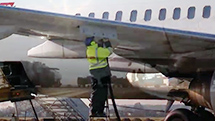
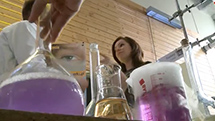
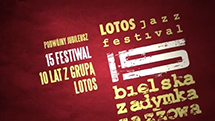
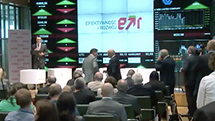



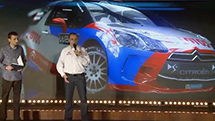


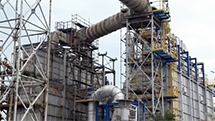
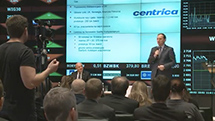
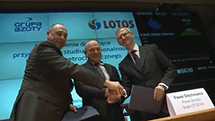
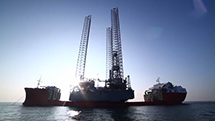
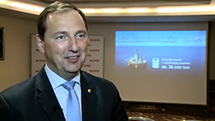
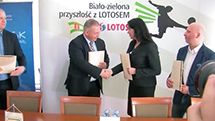

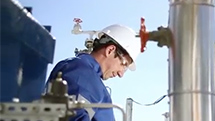


 E-mail
E-mail Facebook
Facebook Google+
Google+ Twitter
Twitter